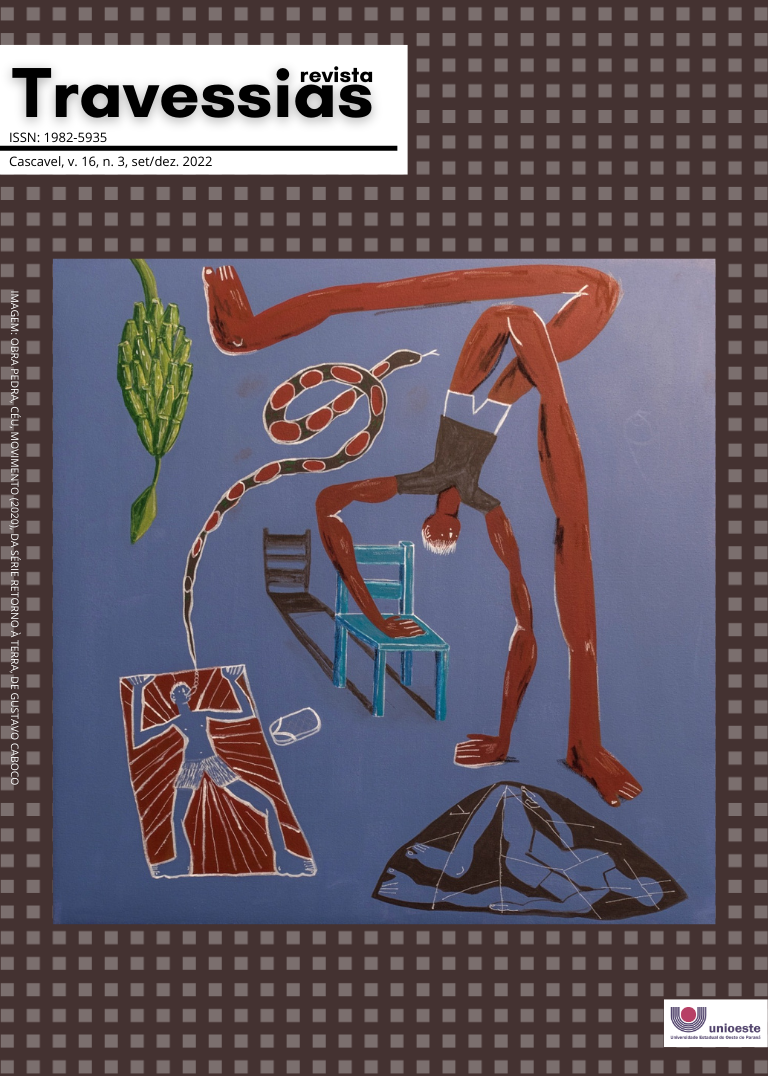Desenho performativo
traçando caminhos para uma Educação Estética Decolonial
DOI:
https://doi.org/10.48075/rt.v16i3.30043Palavras-chave:
Arte Contemporânea, Estéticas Decoloniais, LibertaçãoResumo
Este artigo apresenta considerações que surgiram a partir de uma experiência no estágio supervisionado em Artes Visuais, realizado em uma escola pública em Campo Grande/MS no ano de 2019. Compartilha os desafios e as possibilidades encontrados na proposta de realização de uma produção coletiva de desenho performativo que levantou discussões urgentes a serem pensadas. Com o objetivo de provocar reflexões sobre o campo da educação estética, nos interessa pensar sobre o contexto da América Latina, adotando a perspectiva decolonial (DUSSEL, 2018; GÓMEZ; MIGNOLO, 2012; QUIJANO, 2010, 2005) e os estudos das culturas visuais voltados às contravisualidades, pesquisados por Abreu e Álvares (2019) e Mirzoeff (2016). O estudo problematiza a invasão cultural (FREIRE, 2013, 2000) e os seus impactos na regulação da arte e estética ‘universais’ que nos condicionam historicamente e nos formam como sujeitos. Sugerimos que o desenho performativo pode ser uma prática artística que promove a busca por ser mais, proposta por Paulo Freire (2013, 2000), porque trabalha com as percepções sensoriais e confronta os padrões hegemônicos da estética construída pela visão eurocêntrica. Relacionando a experiência com os estudos teóricos, discutimos a importância do diálogo entre educadoras/es e educandas/os na construção coletiva do conhecimento e de um espaço educativo horizontal capaz de valorizar as presenças conscientes de mundo de cada uma/um.
Downloads
Referências
ABREU, C. L. de; ÁLVAREZ, J. S. O.; MONTELES, N. J. S. O que podemos aprender das contravisualidades? In. Encontro Nacional da Associação Nacional de Pesquisadores em Artes Plásticas, 28º, 2019, Cidade de Goiás. Anais. Goiás: ANPAP, 2019. Disponível em: http://anpap.org.br/anais/2019/PDF/ARTIGO/28encontro______ABREU_Carla_Luzia_de_e_%C3%81LVAREZ_Juan_Sebasti%C3%A1n_Ospina_e_MONTELES_Nayara_Joyse_Silva_831-846.pdf. Acesso em: 10 out. 2022.
CESAIRE, Aimé. Discurso sobre o colonialismo. Lisboa: Sá da Costa, 1978.
DUSSEL, Henrique. Siete hipótesis para una estética de la liberación. Praxis: Revista de Filosofía Nº 77. Enero/junio, 2018. p.1-37.
DUSSEL, Enrique. Oito ensaios sobre cultura latino-americana e libertação. São Paulo: Paulinas, 1997.
ELIAS, Helena; VASCONCELOS, Maria. Desmaterialização e campo expandido: dois conceitos para o desenho contemporâneo. Disponível em: http://conferencias.ulusofona.pt/index.php/lusocom/8lusocom09/paper/viewFile/200/177. Acesso em: 11 out. 2022.
FANON, Frantz. Os condenados da Terra. Rio de Janeiro: Civilização brasileira, 1968.
FIRMINO, Ana Cláudia de Sena. Gestos de desenho em linhas de fuga: estratégias na construção do desenho performativo na Arte Contemporânea. 2019. Dissertação (Mestrado em Artes) - Universidade Federal do Espírito Santo, Vitória – ES. Orientador: Prof. Dr. Ricardo Maurício Gonzaga.
FREIRE, Paulo. Pedagogia do oprimido. Rio de Janeiro: Paz e Terra, 2013.
FREIRE, Paulo. Pedagogia da indignação. São Paulo: Editora UNESP, 2000.
GÓMEZ, Pedro Pablo; MIGNOLO, Walter. Estéticas decoloniales. Bogotá: Universidad Distrital Francisco José de Caldas, 2012.
GUSMÃO, Rita. Espectador na performance: tempo presente. In: MEDEIROS, M. B.; MONTEIRO, M. F. M.; MATSUMOTO, R. K. (orgs.). Tempo e performance. Brasília: Editora da Pós-graduação em Artes da Universidade de Brasília, 2007. Disponível em: http://webartes.dominiotemporario.com/performancecorpopolitica/textostempoperformance/gusmao.pdf. Acesso em: 14 out. 2022.
MIGNOLO, Walter. Desafios decoloniais hoje. Epistemologias do Sul, Foz do Iguaçu/PR, nº 1, p. 12-32, 2017.
MIRZOEFF, Nicholas. O direito a olhar. ETD -Educação Temática Digital, Campinas, SP, v. 18, n. 4, p. 745-768, nov. 2016. ISSN 1676-2592. Disponível em: http://periodicos.sbu.unicamp.br/ojs/index.php/etd/article/view/8646472. Acesso em: 10 out. 2022.
MORAIS, Frederico. Arte é o que eu e você chamamos arte: 801 definições sobre arte e o sistema da arte. Rio de Janeiro: Bazar do Tempo, 2018.
MORAIS, Frederico. Reescrevendo a história da arte latino-americana. In: I Bienal do Mercosul. Porto Alegre, FBAAVM, 1997, p. 12-20 [Catálogo].
PALERMO, Zulma. El arte latinoamericano en la encrucijada descolonial. In: Palermo, Z. (Comp). Arte y estética en la encrucijada descolonial. Buenos Aires: Del Signo, 2009.
QUIJANO, Aníbal. Colonialidade do poder, Eurocentrismo e América Latina. CLACSO, 2010. Disponível em: http://bibliotecavirtual.clacso.org.ar/clacso/sur-sur/20100624103322/12_Quijano.pdf. Acesso em: 09 out. 2021.
QUIJANO, Aníbal. Colonialidade do poder e classificação social. In: SANTOS, Boaventura de Sousa; MENESES, Maria Paula (Orgs). Epistemologias do Sul. São Paulo: Cortez, 2010.
STRECK, R. Danilo; REDIN, Euclides; ZITKOSKI, José Jaime (Orgs). Dicionário Paulo Freire. Belo Horizonte: Autêntica, 2010.
Downloads
Publicado
Como Citar
Edição
Seção
Licença
Copyright (c) 2022 Autores mantêm os direitos autorais e concedem à revista o direito de primeira publicação, com o trabalho simultaneamente licenciado sob CC-BY-NC-SA 4.0 que permite o compartilhamento do trabalho com indicação da autoria e publicação inicial nesta revista

Este trabalho está licenciado sob uma licença Creative Commons Attribution-NonCommercial-ShareAlike 4.0 International License.
Aviso de Direito Autoral Creative Commons
Política para Periódicos de Acesso Livre
Autores que publicam nesta revista concordam com os seguintes termos:
1. Autores mantêm os direitos autorais e concedem à revista o direito de primeira publicação, com o trabalho simultaneamente licenciado sob a Licença Creative Commons Attribution que permite o compartilhamento do trabalho com reconhecimento da autoria e publicação inicial nesta revista.
2. Autores têm autorização para assumir contratos adicionais separadamente, para distribuição não-exclusiva da versão do trabalho publicada nesta revista (ex.: publicar em repositório institucional ou como capítulo de livro), com reconhecimento de autoria e publicação inicial nesta revista.
3. Autores têm permissão e são estimulados a publicar e distribuir seu trabalho online (ex.: em repositórios institucionais ou na sua página pessoal) a qualquer ponto antes ou durante o processo editorial, já que isso pode gerar alterações produtivas, bem como aumentar o impacto e a citação do trabalho publicado (Veja O Efeito do Acesso Livre).
Licença Creative Commons
Esta obra está licenciada com uma Licença Creative Commons Atribuição-NãoComercial-CompartilhaIgual 4.0 Internacional, o que permite compartilhar, copiar, distribuir, exibir, reproduzir, a totalidade ou partes desde que não tenha objetivo comercial e sejam citados os autores e a fonte.



